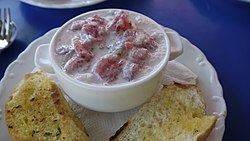'Ota 'ika
 'Ota 'ika | |
| Alternative names | Ika mata, I'a ota, Kokoda, Oka i'a, Poisson cru |
|---|---|
| Type | Salad |
| Course | Appetiser |
| Place of origin | Polynesia, Fiji |
| Region or state | Cook Islands, French Polynesia, Nauru, New Zealand, Niue, Samoa, Tokelau, Tonga, Tuvalu, Wallis and Futuna |
| Main ingredients | Fish, lemon, lime, coconut milk |
Ota ika is a Polynesian dish consisting of raw fish marinated in citrus juice and coconut milk. The Tongan, Tahitian, and Samoan variants are essentially identical in that the raw fish is briefly marinated in lemon or lime juice until the surface of the flesh becomes opaque. The fish is then mixed with coconut milk and diced vegetables (most commonly cucumber, tomato, onion, green onion, and spicy peppers). This is the national dish of Tonga.
The dish is known as kokoda in Fiji, oka in Samoa, ika mata in the Cook Islands and New Zealand, and simply poisson cru on the French islands.[1] The word "ota" means "raw" in Samoan, Tongan, and Tahitian, although the more common term for the dish in French Polynesia is its French equivalent, "poisson cru" (literally, "raw fish").[2][3] Any type of seafood can be used to make "ota," the word "ika" means fish ("i'a" in Samoan language), but the dish is often prepared with mussels ("ota pipi/maso"), prawns ("ota ulavai"), crab ("ota pa'a/paka"), lobster ("ota ula"), octopus/squid ("ota fe'e/feke"), sea urchin ("ota vana/tuitui"), and eel ("ota pusi").
- Variants

Cook Islands Ika mata.

Tuna Poisson cru, served on a banana leaf.
A very similar dish is the kinilaw of the Philippines, and its descendant dish, the kelaguen of the Marianas Islands. The poke of Hawaii is also similar though it does not use citrus juices or coconut milk. It is also similar to the Latin American ceviche, though the latter is relatively recent and may be a derivative dish, as citruses are not native to the Americas.
See also[]
- Ceviche
- Crudo
- Hoe
- Hoe-deopbap
- Kinilaw
- Kelaguen
- List of hors d'oeuvre
- List of raw fish dishes
- List of salads
- Poke
- Tataki
- Singju
- Yusheng
Sources[]
- ^ https://www.google.ca/search?hl=en&tbm=bks&ei=sWijXtShN4mEytMPs7KC0AU&q=poisson+cru+vanatu+national+dish&oq=poisson+cru+vanatu+national+dish&gs_l=psy-ab.3...7316.9603.0.9956.12.12.0.0.0.0.213.1581.0j8j1.9.0....0...1c.1.64.psy-ab..4.0.0....0.vmpAUL9Q3Gs
- ^ The World's Best Street Food: Where to Find It and How to Make It. Lonely Planet Publications. 2012. p. 131. ISBN 978-1-74321-664-4. Retrieved July 30, 2016.
- ^ Haden, Roger (2009). Food Culture in the Pacific Islands. ABC-CLIO. p. 133. ISBN 978-0-313-34492-3.
Further reading[]
- "Ota 'ika (raw fish in coconut milk)", The Polynesian Kitchen
- Fijian cuisine
- Niuean cuisine
- Samoan cuisine
- Tokelauan cuisine
- Tongan cuisine
- Tuvaluan cuisine
- Wallis and Futuna cuisine
- Polynesian cuisine
- Oceanian cuisine
- Uncooked fish dishes
- Seafood dishes
- Raw fish salads

